
This article is particularly close to my heart because it’s been an 18-year journey with huge implications in what I eat. As we all know, one can develop allergies at any point in one’s life. 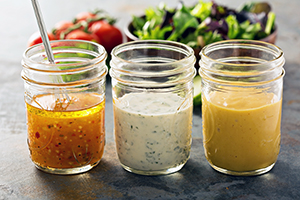 Following chemotherapy and all of my cancer treatment 18 years ago, I suspected that the chemical treatments had left me with huge cooked tomato sauce allergies. Chemo can alter all sorts of things. Every time I would even try a little lasagna, chili or tomato-based soup, I would get violently ill within an hour. However, in the last few months, I discovered the real culprit. Canola Oil! Read on…
Following chemotherapy and all of my cancer treatment 18 years ago, I suspected that the chemical treatments had left me with huge cooked tomato sauce allergies. Chemo can alter all sorts of things. Every time I would even try a little lasagna, chili or tomato-based soup, I would get violently ill within an hour. However, in the last few months, I discovered the real culprit. Canola Oil! Read on…
First, did you know that most restaurants use canola oil in their salad dressings and sauces? Even fine dining restaurants use canola oil for fried foods. It’s inexpensive and readily available. It’s also in your margarines and condiments.
Note: This is a longer post than usual but I feel it’s VERY important information to put this out there.
Knowledge is power = better health. Please feel free to pass this along.
What Exactly Is Canola Oil?
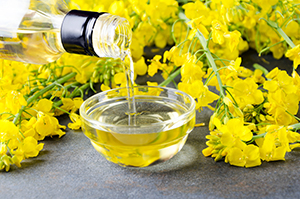 It’s a vegetable-based oil. Canola is globally, an important oilseed that is actually “created” and comes from the words “Canada” and “ola” meaning oil. Canola is the second largest oil crop in the world and its food use continues to grow. In 1978, the Western Canadian Oilseed Crushers Association used the name “canola” to trademark rapeseed varieties, but by 1980, the Canola Council of Canada took over the trademark.
It’s a vegetable-based oil. Canola is globally, an important oilseed that is actually “created” and comes from the words “Canada” and “ola” meaning oil. Canola is the second largest oil crop in the world and its food use continues to grow. In 1978, the Western Canadian Oilseed Crushers Association used the name “canola” to trademark rapeseed varieties, but by 1980, the Canola Council of Canada took over the trademark.
In 1985, the FDA declared canola oil as GRAS (generally recognized as safe) and it was finally introduced to the American market. It began appearing on food labels by 1988.
In a Healthline article, it is noted that “most canola crops are genetically modified (90%) which improves the quality of the oil and increases the plant’s tolerance to herbicides. GM canola makes up 95% of canola planted in the US.”
There is a very comprehensive process for manufacturing canola seed into oil, which is similar to that of other oilseeds. That process includes cleaning, heating and flaking (rupturing the cell walls and “flaking “the seeds to get a desired thickness), cooking, pressing, extracting, refining and processing. When we hear of “processed foods” well…you get the idea.
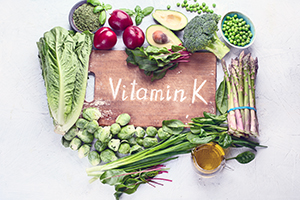
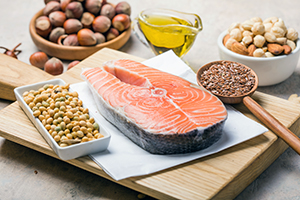 Is Canola Oil Healthy or Risky to One’s Health?
Is Canola Oil Healthy or Risky to One’s Health?
First, let me note that in my research the FDA says it’s safe for human consumption while others I researched are adamant about avoiding canola oil. There are studies and clearly strong feelings on both sides regarding the safety of this oil.
Benefits: (according to some health experts)
- Low in saturated fat with high proportion of monounsaturated fat
- Good source of Vitamins E and K
- High in levels of Omegas 3, 6 and 9; good for brain health
Health Risks:
 Metabolic Syndrome (According to the Mayo Clinic): Metabolic syndrome is a cluster of conditions that occur together, increasing your risk of heart disease, stroke and type 2 diabetes. These conditions include increased blood pressure, high blood sugar, excess body fat around the waist, and abnormal cholesterol or triglyceride levels). Having just one of these conditions doesn’t mean you have metabolic syndrome. But it does mean you have a greater risk of serious disease. And if you develop more of these conditions, your risk of complications, such as type 2 diabetes and heart disease, rises even higher.
Metabolic Syndrome (According to the Mayo Clinic): Metabolic syndrome is a cluster of conditions that occur together, increasing your risk of heart disease, stroke and type 2 diabetes. These conditions include increased blood pressure, high blood sugar, excess body fat around the waist, and abnormal cholesterol or triglyceride levels). Having just one of these conditions doesn’t mean you have metabolic syndrome. But it does mean you have a greater risk of serious disease. And if you develop more of these conditions, your risk of complications, such as type 2 diabetes and heart disease, rises even higher.
Metabolic syndrome is increasingly common, and up to one-third of U.S. adults have it. If you have metabolic syndrome or any of its components, aggressive lifestyle changes can delay or even prevent the development of serious health problems.
Other health risks:
 Increased Inflammation (through consumption and heating
Increased Inflammation (through consumption and heating- Increased risk of cancer
- Increased risk of heart calcification
- Increases of “bad” LDL cholesterol
- Increases in blood pressure
- Increased high blood sugar levels
- Weight gain and excess belly fat
 Increased risk for heart disease
Increased risk for heart disease- Increased risk for memory issues
- Increased risk to liver and kidney functioning (our powerhouse detoxifying organs)
- Genetically engineered foods also pose some very serious health concerns including:
- Allergic reactions (I believe that applies to me)
- Immuno-suppressed body
- Loss of nutrition through the foods we eat
Here are some other important links to check out on the possible risks of canola oil in your diet:
https://perfectketo.com/canola-oil/
https://optimalbreathing.com/blogs/nutrition-and-digestion/canola-oil-danger
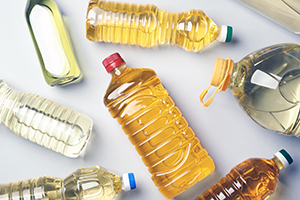 Label Importance! Buyer Beware
Label Importance! Buyer Beware
As “vegetable oil” is used to cover a variety of different oils including peanut, sesame, sunflower and rapeseed, this is an important one to be aware of, particularly for those with nut allergies.
Back to My Story
A few months ago, I was having lunch with a friend, eating a salad. The lemon vinaigrette sounded so delicious that I ordered that INSTEAD of my usual olive oil and vinegar. Imagine my surprise when within the hour I became violently ill. But wait, this wasn’t cooked tomato sauce. Knowing that none of the salad ingredients were ever problematic to my digestive track, I called the restaurant the next day and inquired as to the ingredients. There were only 3-One of them was canola oil. I made a trip to the grocery store and started looking at labels of jars of pre-made tomato sauce. Ninety percent contained canola oil. A few contained olive oil. I grabbed one of those off the shelf and took it home for further research. I heated it up in a saucepan (first time in 18 years!) and poured a small amount over pasta. Would you believe I had no reaction?
I have come to learn that many home cooks also grab a favorite jar of tomato sauce off the shelves for the convenience of saving time, some of them family and friends.
After 18 years avoiding all cooked tomatoes, I have finally found the aggravating culprit to be Canola Oil!! I can also report that I’ve recently INDULGED in many foods like Spaghetti Bolognese! Heavenly! I will add that I only do this in restaurants that cook with olive oil. For me it’s critically health important for me to inquire at every restaurant we go to as to the menu items that are cooked in Canola oil. I get it, it’s inexpensive and I don’t think it bothers the majority of consumers.
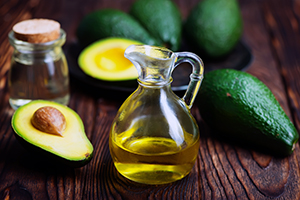
Avocado oil is a safe alternative as well.
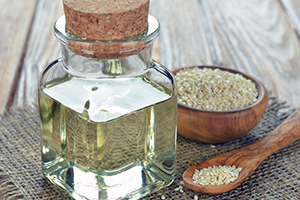
Sesame oil is great to use for those with peanut allergies.
But my body definitely doesn’t like this oil.
What are Other Safe Alternative Cooking Oils?
According to Dr. Edward Group of Global Healing, these are his recommendations for Healthiest and Least Healthy Cooking Oils:
- Olive Oil-good for sautéing at lower heat
- Walnut Oil-low heat cooking
- Avocado Oil-high smoke point so great for high heat cooking and frying
- Grapeseed Oil-high smoke point-great for high heat cooking
- Sesame Oil-high heat cooking and nice alternative for those with peanut allergies
- Coconut Oil-High heat cooking-frying, sauteing, baking
- Olive, Walnut, Avocado, Flaxseed, and Grapeseed, are wonderfully healthy when used in salad dressings, marinades and dips. Some people add Coconut Oil to their coffee.
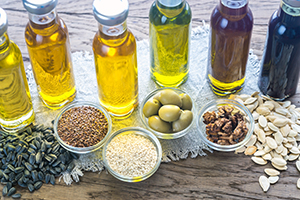 Oils Not Recommended
Oils Not Recommended
(by Dr. Edward Group, see above)
Steer clear of hydrogenated oils — such as what you find in margarine or many packaged foods — because they contain dangerous trans fats. Avoid soybean, corn, palm kernel, cottonseed, canola, and grape seed oil which likely contain GMOs or are extracted with harsh chemical solvents.
If you or anyone you know is struggling with any of the health issues noted in the article, it might be worth sharing this information with them so that they might evaluate the canola oil consumption in their diets.
 This all being said, and after reading my notes on both sides re the health safety of consuming canola oil, I hope that you may have learned a little bit more today. I’ve learned a ton over the past few weeks in researching all this. While there are studies linking Canola Oil to some health benefits, others suggest it causes inflammation and heart and memory issues. We’ll await more studies, but in the meantime, please choose your oils wisely.
This all being said, and after reading my notes on both sides re the health safety of consuming canola oil, I hope that you may have learned a little bit more today. I’ve learned a ton over the past few weeks in researching all this. While there are studies linking Canola Oil to some health benefits, others suggest it causes inflammation and heart and memory issues. We’ll await more studies, but in the meantime, please choose your oils wisely.
Peace and Good Health!
If you “Like” this post, I’d be thrilled if you’d share it.
Resources:
Healthline
Fuck Cancer
Global Healing – Dr. Edward Group – “Healthiest Cooking Oils: 7 Oils to Use & 7 to Avoid” 11/12/18
Mayo Clinic
optimalbreathing.com
perfectketo.com
JUL
